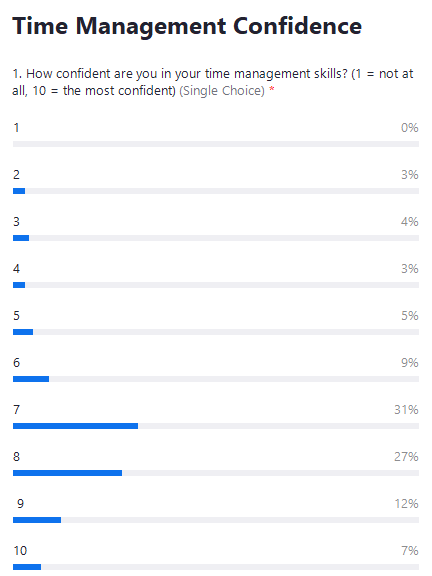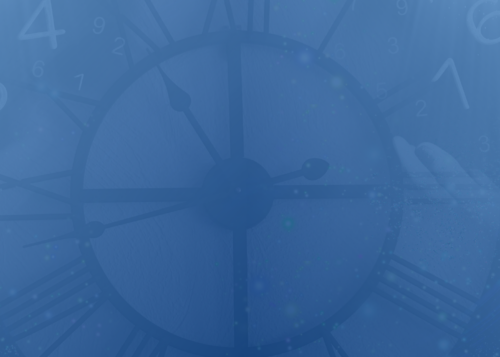Time Management

SDR Symposium – October, 2021
Sometimes, it feels like there just aren’t enough hours in a day.
Between making dials, researching new accounts, attending internal meetings, crafting messaging, and working on self-development, SDRs spin a lot of plates.
It’s easy to understand why time management is such a crucial skill.
The ability to organize your schedule and work as efficiently as possible is what separates a good SDR from a great one. After all, organized schedules get organized results. Sporadic schedules get sporadic results.
We tapped 3 SDRs and 1 Director to talk about how they organize their schedules. Our panel dishes out some tips and best practices to help SDRs build and maintain a schedule that works for them.
The Panel
Pulse Check
Like many of our symposiums, we started this one with a poll
The goal? Before diving into tips & best practices, we wanted to see if our SDRs felt like they had a grasp on their time management skills.

And, it looks like a good amount of reps had a handle on their schedules. But that’s not to say there isn’t something they could learn from this session!
Diving into the minds and habits of others can illuminate areas of opportunity within your own processes. And even the smallest of changes can make big differences.
What IS Time Management?
Starting any discussion by defining what you’re talking about seems like a good first step. So we asked our panel: “What does time management mean to you?”
As expected, the panel all had different (yet similar) answers.
For Maria, time management boiled down to organization. Without it, you wouldn’t know where to start your day or which tasks took priority. It’d be very difficult to get things done in an efficient or timely fashion.
Hannah echoed the efficiency statement. For her, time management means being as productive as possible each day. How she structures and plans her day directly impacts her overall productivity.
Julianna doubled down on the structure side of things. She’s found a ton of success at building her day based on when she knows she’s most productive. She’s all about making her calendar work for her, not the other way around.
Stephen summed all of those answers up in a simple, yet powerful, quote:
“Organization and time management are one and the same. It’s up to you to set yourself up for success. You have to set a plan and follow it.“
Knowing what our panel thinks of when they hear the phrase “time management” will help us better understand their answers to our future questions.
The Big One
We shook things up a bit this time around and had our panelists deliver their top trick/tip earlier in the discussion. It’s almost like we were making the best use of our time by structuring the conversation this way…
Maria kicked us off by talking about prioritization. Knowing how to prioritize your tasks is the single most important thing to having an organized schedule. If you see more success with prospects live on the phone vs. email, you should prioritize your calling blocks. Similarly, if you see a lot of success warming up your leads with LinkedIn conversations, budget time in your day to accomplish that.
Julianna took that idea a step further and urged the audience to spend time every morning studying their calendars. There are time slots on there that are set in stone, and you have to work around them. Use the available time to your advantage. If you know your calls are more productive in the morning, make sure to use your available morning time for calls.
Mondays and Fridays are key for this. You can plan your week by studying your calendar on a Monday, and you can reflect on how productive your past week was on a Friday. This alone can help you tremendously.
Stephen lives and dies by his calendar. If it’s not on there, it might as well not exist. So he was obviously a big fan of what Maria and Julianna were saying. He even advocated for the idea of setting up recurring tasks as reminders in your calendar. That way, even if you are deviating from your schedule (it happens to the best of us), you’ll get a convenient ping to get you back on track.
And while Hannah also fills her calendar up with tasks and events, she likes to take the time to transfer them into a notebook each day as well. That way, you have digital and analog reminders of what your tasks are for the day and week. Plus, the act of crossing something out on a physical to-do list is so satisfying!
—
Let’s focus on a key point from the panel here – the idea of time-blocking.
If something is important / considered a priority, it should live in your calendar. That way you have dedicated time set aside to accomplish it AND no one will (hopefully) schedule over that time. Most tasks are easier to accomplish when you aren’t interrupted while doing them – achieving a “flow state” of sorts. That level of focus is hard to achieve, and the last thing you want is to break it because your calendar wasn’t updated.
Time-blocking also brings up another point made by our panelists – scheduling high-priority tasks during the times you know you’re productive. Over time, you’ll notice patterns within your work schedule. Personally, I’m much more productive in the late afternoon (I know, it’s weird). Because of that, I make sure to save tasks that require more concentration and effort for that time slot. On the flip side, since I’m not as energized in the mornings, I reserve that time for “grunt work” type tasks (ones that require little attention but lots of time).
That concept is what Jeb Blount calls “Golden Hours.” Basically, you don’t want non-revenue-generating activities to interfere with revenue-generating activities. For SDRs, revenue-generating activities = making dials. Your call blocks are your golden hours, and you should protect those at all costs. You should also schedule them during times you know you have the most energy. The goal is to make those focused blocks of time as productive as possible.
Ideally, you should understand just how important all of your tasks are in relation to one another. This makes blocking off those hours around your golden hours (known as platinum and silver hours) more effective.
Getting Back On Track
The above is all well and good, but we know not every SDR will be able to perfectly organize their schedules. Sometimes, there are unavoidable distractions that have to be dealt with. Sometimes the time block you’re in isn’t clicking for some reason. Sometimes you can imagine doing anything BUT what your calendar says.
Maria likes to schedule breaks in her day to limit those feelings of inefficiency and derailment. The bit of mental clarity she gets when stepping away from her laptop (to take a walk or grab a snack) prepares her to refocus on the task at hand. She even uses a Chrome App, Break Timer, to help her plan out those breaks.
You can also use the Pomodoro Technique to make sure you don’t burn out on a task or get derailed.
Julianna and Stephen both brought up the idea of task-switching. If for some reason the block of time you’re in isn’t doing it for you, swap it with a different one. Sometimes the simple act of doing something different can “soft reset” your brain and allow you to refocus for the day. For example, if the block of time you’re in is supposed to be dedicated to follow-ups and nobody is answering your calls, switch your focus to pulling in new accounts to prospect instead. That bit of energy and adrenaline that comes with prospecting a new account could help break a slump and get you back on track for the day.
☕ Even though it was brought up as a joke, Julianna mentioned coffee as a motivator to get back on track. Whether it’s coffee, candy, carrots, or Chardonnay (ok not that), rewarding yourself with a treat can help settle you down and refocus on the task at hand.
Even if you get side-tracked and have to deal with something you didn’t anticipate, our panel all agreed that the best thing to do is roll with the punches. If you’ve done the work to time-block and protect your Golden Hours, a deviation from your schedule shouldn’t impact you all that much. And, if “unplanned meetings” keep popping up (looking at you, SDR Managers), you could even prepare for it and bake some extra time in your day.
Setting Boundaries
We won’t sugarcoat anything – time management has become more challenging (and crucial) as teams make the shift to working from home. And as we found out from our panel, those changes can be for better or worse!
Hannah and Stephen both fully admitted that the limited time they’ve spent in office has been far more distracting than time spent at home. Seeing other people in person (even if you’re still socially distant) breeds conversation – and a few 10-15 minute chats can really add up. Budgeting your time accordingly to bake in those social interactions is crucial to having a productive day.
On the flip side, while working from home you might have little to no distractions available. Combine that lack of social interaction with a failure to time-block, and you can spend an extra hour on a task by accident like * snaps * that.
Julianna schedules lunch on her calendar for this reason. It’s easy to get lost in something and forget to eat. But if it lives in your calendar, that reminder to step away and grab a bite will eliminate those chances. Similarly, Hannah schedules walks in her calendar. A quick 20-minute excursion outside can clear your head and prepare you to re-focus on your remaining tasks.
The biggest boundary to set is actually logging off – and not just literally. It’s easy to blend the role of work and home when they’re in the same location. That means even when you’ve “clocked out” for the day, it’s easy enough to see an email come through and pop back online to handle it. Next thing you know it’s 8pm and you’re in the middle of a killer email rewrite session with no end in sight (maybe that’s just me?).
Maria’s advice? Once you log off, stay logged off. If something important comes through you can write it down in a notebook or on a sticky note to remind you first thing in the morning.
Tools & Process Recommendations
Outside of advice and best practices, a couple of our panelists came prepared with tools & processes they use to keep themselves on track & organized throughout the day.
Maria uses Workflowy to keep her notes, tasks, and projects organized in a place outside of her calendar. The thing she likes the most about it is how open & customizable it is. Instead of working within a tool’s existing structure, she’s able to make the tool work for her.
The idea of having a location that isn’t your calendar to track tasks came up a few times during the symposium, and for good reason. Whether you use a tool like Workflowy or good old-fashioned pen & paper, having a separate location to track your daily/weekly/monthly progress can help tremendously. Cross-referencing tasks and keeping tabs on unexpected requests has saved my butt time and time again!
Stephen is a huge proponent of using Google Tasks to organize his schedule. It lives within Gmail and Google Calendar, so not only can you build a running to-do list within your email instance, you can attach due dates to tasks and have them populate in your calendar. Getting that calendar notification almost ensures that he addresses the task in a timely fashion (instead of forgetting all about it and panicking at the end of the day).
At the end of the day, time management is all about creating a system and process that works for you. The only consistent trait between everyone’s system is that they’ve used evidence to create an efficient agenda.
The blocks of time you’re most productive won’t be the same as everyone else.
The tools you find useful won’t be the same as everyone else.
The tasks you prioritize won’t be the same as everyone else.
What matters is building foundational skills around how you build a system for time management, and using those skills to create a system that works for you.
Want to continue the conversation with someone from our team? Drop us a note!
Looking for more resources on time management? Check out a couple of past blogs on the topic:


Related Resources
Continue exploring

When should businesses outsource sales development?

SDR vendor evaluation checklist: A strategic tool for sales & marketing leaders

Top 10 Trends for SaaS Sales and Marketing Leaders to Watch in 2025

How You Can (And Should) Adapt Your Revenue Development Strategies in Response to Market Trends

Why Invest in Sales Development Reps (SDRs)?

The Fate of Sales Development



